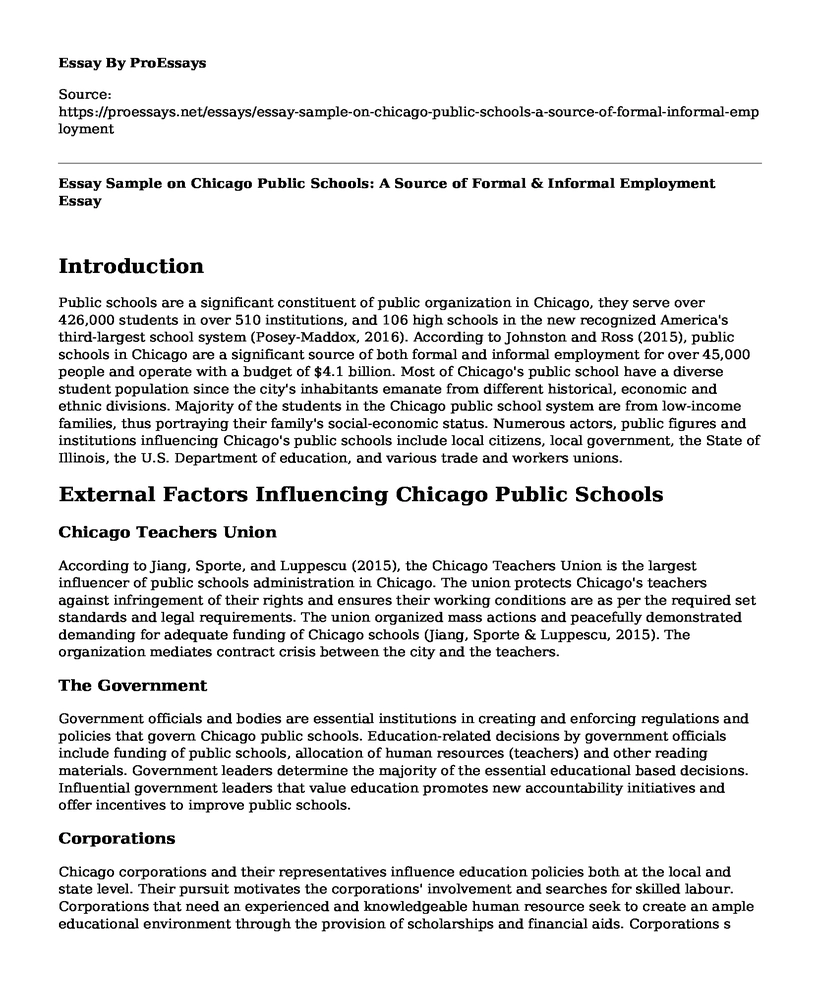Introduction
Public schools are a significant constituent of public organization in Chicago, they serve over 426,000 students in over 510 institutions, and 106 high schools in the new recognized America's third-largest school system (Posey-Maddox, 2016). According to Johnston and Ross (2015), public schools in Chicago are a significant source of both formal and informal employment for over 45,000 people and operate with a budget of $4.1 billion. Most of Chicago's public school have a diverse student population since the city's inhabitants emanate from different historical, economic and ethnic divisions. Majority of the students in the Chicago public school system are from low-income families, thus portraying their family's social-economic status. Numerous actors, public figures and institutions influencing Chicago's public schools include local citizens, local government, the State of Illinois, the U.S. Department of education, and various trade and workers unions.
External Factors Influencing Chicago Public Schools
Chicago Teachers Union
According to Jiang, Sporte, and Luppescu (2015), the Chicago Teachers Union is the largest influencer of public schools administration in Chicago. The union protects Chicago's teachers against infringement of their rights and ensures their working conditions are as per the required set standards and legal requirements. The union organized mass actions and peacefully demonstrated demanding for adequate funding of Chicago schools (Jiang, Sporte & Luppescu, 2015). The organization mediates contract crisis between the city and the teachers.
The Government
Government officials and bodies are essential institutions in creating and enforcing regulations and policies that govern Chicago public schools. Education-related decisions by government officials include funding of public schools, allocation of human resources (teachers) and other reading materials. Government leaders determine the majority of the essential educational based decisions. Influential government leaders that value education promotes new accountability initiatives and offer incentives to improve public schools.
Corporations
Chicago corporations and their representatives influence education policies both at the local and state level. Their pursuit motivates the corporations' involvement and searches for skilled labour. Corporations that need an experienced and knowledgeable human resource seek to create an ample educational environment through the provision of scholarships and financial aids. Corporations s provide amenities like funding and promoting extracurricular activities like basketball and football activities for Chicago's public schools. Corporations offer advice to leaders governing Chicago public schools regarding education policies.
Parents
Chicago parents are significantly influential stakeholders in the failure or success of Chicago's public school system. Adverse social-economic status concerns are motivating Chicago parents to encourage their children to attain better grades and enrol for colleges that provide opportunities for success. Through education and professional associations, parents are lobbing state lawmakers into creating education promoting policies, decisions and financial allocations to public schools.
Social Justice
Majority of students in the Chicago public school system are from low-income families. Homelessness and food insecurity characterize most of Chicago's societies; they reflect and portray poverty and low living standards. Social justice inequalities in Chicago get described by poor housing, low-income inhabitants and criminal justice inequalities. Children brought up in such environments face a myriad of challenges that negatively affect their learning and daily life (Simon, & Johnson, 2015). It results in negative classroom experiences and expulsions.
State and Local Funding
The public schools' system in Chicago is struggling with overreaching financial challenges that are characterized by pension shortfalls, reduced funding from the state, and declined enrollment. These conditions attribute to states experiencing delays in paying its employees' pension and maintaining a guaranteed stream of income for retired teachers. Due to inadequate funding of Chicago public schools, most teachers get demotivated, resulting in sparse learning (Simon & Johnson, 2015).
References
Jiang, J. Y., Sporte, S. E., & Luppescu, S. (2015). Teacher perspectives on evaluation reform: Chicago's REACH students. Educational Researcher, 44(2), 105-116. Retrieved from: https://journals.sagepub.com/doi/abs/10.3102/0013189x15575517.
Johnston, D. K., & Ross, H. (2015). Teaching to Higher Standards: From Managing to Imagine the Purposes of Education. In Taking Teaching Seriously (pp. 21-24). Routledge. Retrieved from: https://www.taylorfrancis.com/books/e/9781315631783/chapters/10.4324/9781315631783-9.
Posey-Maddox, L. (2016). Beyond the consumer: Parents, privatization, and fundraising in US urban public schooling. Journal of Education Policy, 31(2), 178-197. Retrieved from: https://www.tandfonline.com/doi/abs/10.1080/02680939.2015.1065345.
Simon, N. S., & Johnson, S. M. (2015). Teacher turnover in high-poverty schools: What we know and can do. Teachers College Record, 117(3), 1-36. Retrieved from: https://pdfs.semanticscholar.org/6210/6fb22387ad72a41d26403ec6851b2f0fd71c.pdf.
Cite this page
Essay Sample on Chicago Public Schools: A Source of Formal & Informal Employment. (2023, Mar 27). Retrieved from https://proessays.net/essays/essay-sample-on-chicago-public-schools-a-source-of-formal-informal-employment
If you are the original author of this essay and no longer wish to have it published on the ProEssays website, please click below to request its removal:
- Research Paper on Academic Excellence of the African Americans Studying in the USA
- Leadership Experience as a High School Basketball Leader Paper Example
- Public School System and Academic Success Essay Example
- Paper Example on Ages of Languages: How Old is Old?
- Article Analysis Essay on Ethics of Literacy Research in the 21st Century
- Essay Example on Nursing Student Characteristics: Skills for Future Success
- Essay Example on Setting Up Daycare: Benefits for Kids of All Ages







